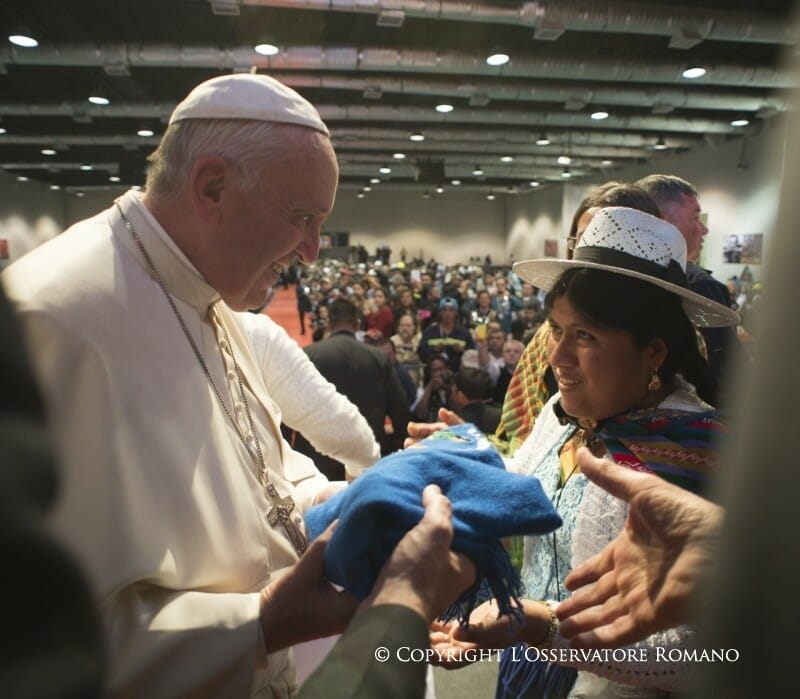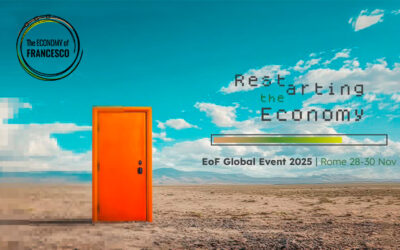 “I’ve discovered how the Pope favors the excluded. In some way it’s also my choice, but by his example I have understood how at times I continue to exclude, or I find myself in a group of people who keep silent in the midst of exclusions or injustices,” says Ana Maria Ceballos, a social worker in Bolivia. An impression that speaks of true conversion towards the excluded, one of the strongest themes of this step of the voyage of Pope Francis in Latin America. The same for Nestor Ariñez di Cochabamba, who lives in the Casa de los Ninos, a social project animated by the spirituality of unity: “In Palmasola the Pope said: reclusion is not the same as exclusion.” There, in the largest penitentiary in Bolivia, the most striking message was the pope’s “listening first of all, and then his saying that he too is a man who makes mistakes and who must do ‘penance.’ A message of hope for all the detainees.” “The pope’s visit to Bolivia leaves us with much to reflect upon,” he continues. “But I believe that what remains very clear is his preferential option for the poor, the motto of the Church in Latin America given to Puebla in 1979, which reminds us that the gospel brings the good news to everyone, but especially to those who are excluded and rejected by society. I felt that the Pope was speaking directly to us.” “His words are a call to conversion,” confides Pat, a Bolivian focolarina, after the meeting with priests, religious, and consecrated people. “But it is also much more: the sole fact of his presence in the midst of many ‘rare flowers of every age’ who one day said their yes to God, pushed me towards a greater commitment to sanctity, which then means to live with coherence the choice I made.” “Even from Bolivia, Pope Francis spoke to the whole world,” writes Lucas Cerviño, now 11 years in Bolivia, instructor in Missiology and intercultural theology. “At the mass in Santa Cruz there were many Latin Americans from nearby countries who listened to his call to not despair before the difficult situations that the world presents to us and that bring us to exclusion.” At the second meeting of popular movements, Pope Francis–before representatives from various continents who welcomed him with enthusiasm and attention–clearly indicated the way for social renewal, both local and global. “Land, Home, and Work,” continues Cerviño, “are sacred rights which permit us to dialogue with everyone in order to contribute to the common good. Pope Francis clearly highlighted for the members of social and popular movements that the fundamental aspect is the process, the starting of processes, for an economy at the service of peoples, to unite peoples on the way towards peace and justice, and for the defense of the homeland.” “Finally,” concludes Cerviño, “he left the Bolivian people a clear and beautiful consignment.” “Bolivia is at an historic crossroads: politics, the world of culture, the religions are all part of this beautiful challenge to grow in unity. In this land whose history has been marred by exploitation, greed and so many forms of selfishness and sectarianism, now is the time for integration. And this is a path we have to walk. Today Bolivia is capable, with its wealth, of creating new forms of cultural synthesis. How beautiful are those cities which overcome paralyzing mistrust, integrate those who are different and make this very integration a new factor of development! How attractive it is when those cities are full of spaces which connect, relate and favor the recognition of others! Bolivia in its process of integration and its search for unity, is called to be an example of such ‘multifaceted and inviting harmony,’ a harmony which invites along the path of strengthening the greater country.”
“I’ve discovered how the Pope favors the excluded. In some way it’s also my choice, but by his example I have understood how at times I continue to exclude, or I find myself in a group of people who keep silent in the midst of exclusions or injustices,” says Ana Maria Ceballos, a social worker in Bolivia. An impression that speaks of true conversion towards the excluded, one of the strongest themes of this step of the voyage of Pope Francis in Latin America. The same for Nestor Ariñez di Cochabamba, who lives in the Casa de los Ninos, a social project animated by the spirituality of unity: “In Palmasola the Pope said: reclusion is not the same as exclusion.” There, in the largest penitentiary in Bolivia, the most striking message was the pope’s “listening first of all, and then his saying that he too is a man who makes mistakes and who must do ‘penance.’ A message of hope for all the detainees.” “The pope’s visit to Bolivia leaves us with much to reflect upon,” he continues. “But I believe that what remains very clear is his preferential option for the poor, the motto of the Church in Latin America given to Puebla in 1979, which reminds us that the gospel brings the good news to everyone, but especially to those who are excluded and rejected by society. I felt that the Pope was speaking directly to us.” “His words are a call to conversion,” confides Pat, a Bolivian focolarina, after the meeting with priests, religious, and consecrated people. “But it is also much more: the sole fact of his presence in the midst of many ‘rare flowers of every age’ who one day said their yes to God, pushed me towards a greater commitment to sanctity, which then means to live with coherence the choice I made.” “Even from Bolivia, Pope Francis spoke to the whole world,” writes Lucas Cerviño, now 11 years in Bolivia, instructor in Missiology and intercultural theology. “At the mass in Santa Cruz there were many Latin Americans from nearby countries who listened to his call to not despair before the difficult situations that the world presents to us and that bring us to exclusion.” At the second meeting of popular movements, Pope Francis–before representatives from various continents who welcomed him with enthusiasm and attention–clearly indicated the way for social renewal, both local and global. “Land, Home, and Work,” continues Cerviño, “are sacred rights which permit us to dialogue with everyone in order to contribute to the common good. Pope Francis clearly highlighted for the members of social and popular movements that the fundamental aspect is the process, the starting of processes, for an economy at the service of peoples, to unite peoples on the way towards peace and justice, and for the defense of the homeland.” “Finally,” concludes Cerviño, “he left the Bolivian people a clear and beautiful consignment.” “Bolivia is at an historic crossroads: politics, the world of culture, the religions are all part of this beautiful challenge to grow in unity. In this land whose history has been marred by exploitation, greed and so many forms of selfishness and sectarianism, now is the time for integration. And this is a path we have to walk. Today Bolivia is capable, with its wealth, of creating new forms of cultural synthesis. How beautiful are those cities which overcome paralyzing mistrust, integrate those who are different and make this very integration a new factor of development! How attractive it is when those cities are full of spaces which connect, relate and favor the recognition of others! Bolivia in its process of integration and its search for unity, is called to be an example of such ‘multifaceted and inviting harmony,’ a harmony which invites along the path of strengthening the greater country.”
Look with pure eyes
Look with pure eyes




0 Comments